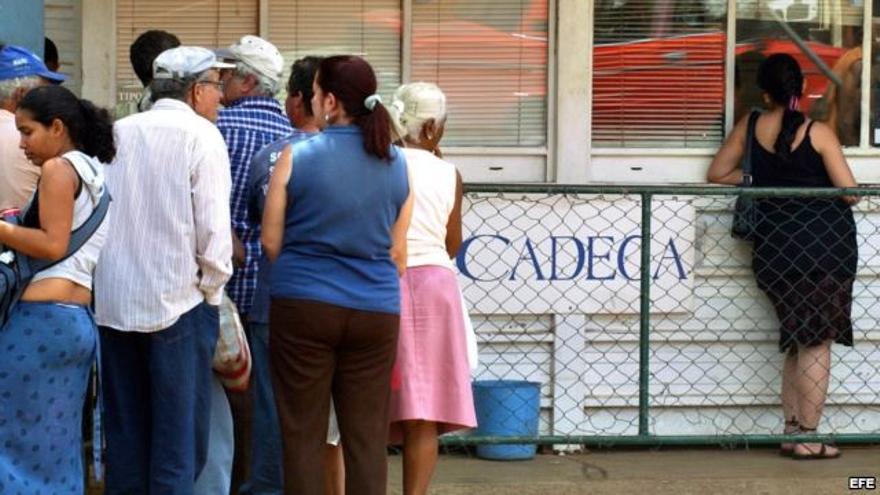
![]() 14ymedio, Havana, November 9, 2021 — The Cuban government’s top priority is controlling inflation. That is what economics minister Alejandro Gil claimed during an interview on Radio Reloj over the weekend. Gil said the solution lay in increasing the amount of goods and services available at businesses that accept payment in Cuban currency.
14ymedio, Havana, November 9, 2021 — The Cuban government’s top priority is controlling inflation. That is what economics minister Alejandro Gil claimed during an interview on Radio Reloj over the weekend. Gil said the solution lay in increasing the amount of goods and services available at businesses that accept payment in Cuban currency.
In a statement released on social media by People’s Saving Bank, former economics minister Joaquin Benavides proposed five concrete steps to reduce inflation. First, he proposes that Cadeca, a chain of state-run currency exchange bureaus, adopt a floating rate of exchange with the dollar. Instead of the current fixed rate of 24 pesos to the dollar, the Cuban currency’s value would fluctuate based on actual demand. This would allow currency exchanges to better compete with the informal market, where the current rate is 70 pesos to the dollar.
Benavides was head of the Central Committee’s economics department from 1977 to 1980, and president of the National Commission on Economic Direction from 1986 to 1991. Among his recommendations are a rapid increase in the approval process for small and medium-sized companies, and allowing these companies to import directly rather than going through a government intermediary, as they are now required to do.
Benavides argues that the state should prioritize the establishment of wholesale markets for small and medium-sized business cooperatives. Finally, he argues, “It is necessary to begin the process of unloading excess fixed assets and assets from state companies with losses.” In other words, shut down or streamline money-losing operations.
The current economics minister mentioned none of these things during his interview on Radio Reloj. Instead, he pointed the finger at the United States, calling it “the main obstacle to our development.”
“Cuba’s financial liquidity has been severely restricted by foreign exchange earnings,” replied Gil to a question about shortages at state-owned businesses. He cited two reasons: a tightening of the U.S. embargo which, he claimed, is keeping foreign currency, including remittances out of the country, and the covid-19 pandemic, which has all but paralyzed the tourism industry.
Since the interviewer did not ask him about it, the minister did not have to explain where the money is coming from to build a new spate of luxury hotels.
Without referring to currency unification, which took effect at the beginning of this year with the goal of ending the economic crisis plaguing the country, Gil reminded listeners that hard currency stores were intended to be a way of keeping foreign currency reserves from leaving the country. The state-owned stores, known as MLCs for the acronym for freely convertible currency, have been the subject of widespread criticism by that portion of the public which does not have access to U.S. dollars.
Gil said that more than 300 million dollars earned through MLC stores was used to offer consumers more choices at peso-denominated stores. “When we were crafting these measures, we should have allotted more resources to the peso market,” he admits.
Though he describes himself as “ever optimistic,” Gil cautions that the situation will not be resolved in fifteen days or when the country reopens to tourism, as is expected on November 15. “We’ve lost 13% of our GDP, three billion dollars of income,” he notes. In the first half of 2021, Cuba’s economy shrank by around 2%. “We are not going to recover from this just by following five steps,” he admits.
Two weeks ago, economic reform czar Marino Murillo, one of the chief authors of currency unification, acknowledged that the policy has not produced the expected results and has inadvertently led to runaway inflation.
Madrid-based economist Elias Amor Bravo believes much of the blame for the rise in prices is currency unification itself.
In an article published on Monday, he looks at official government statistics on agricultural output between January and September of this year and concludes that inflation will continue to grow. “Without imports to augment the low-level of domestic production due to a shortage of foreign reserves, there will not be any easing of inflationary pressure on the cost of food,” he writes.
____________
COLLABORATE WITH OUR WORK: The 14ymedio team is committed to practicing serious journalism that reflects Cuba’s reality in all its depth. Thank you for joining us on this long journey. We invite you to continue supporting us by becoming a member of 14ymedio now. Together we can continue transforming journalism in Cuba.
